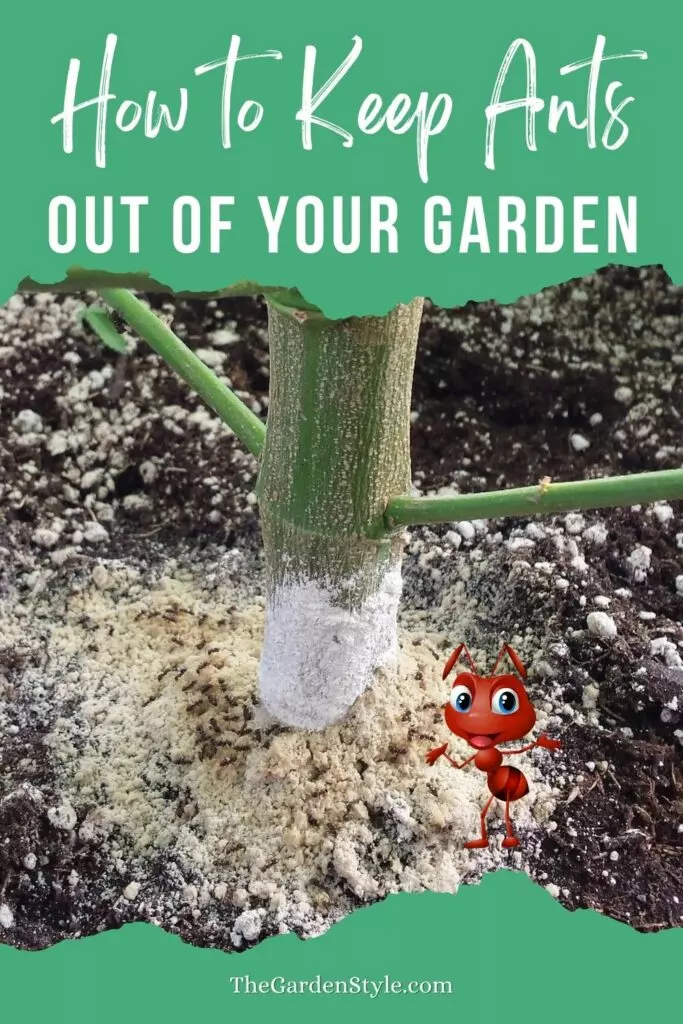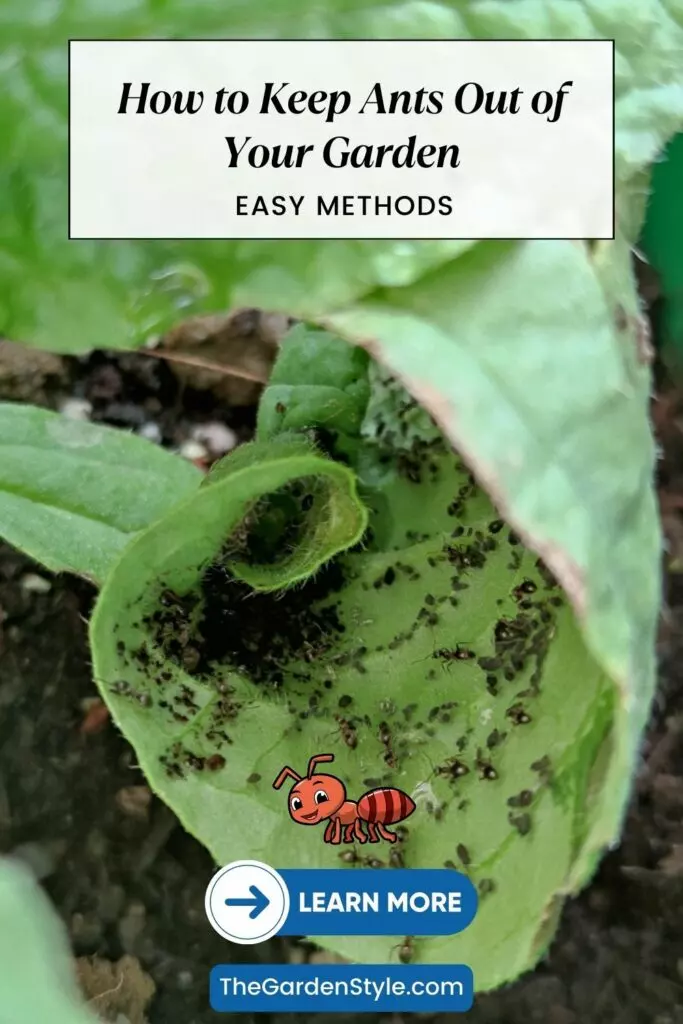They may seem small and harmless, but ants can quickly turn your thriving garden into a relentless battleground. These tiny troopers will ruthlessly hollow out your ripe tomatoes, carry off precious seeds, and nurture sap-sucking aphids that coat your plants in sticky, sweet waste. Left uncontrolled, an army of ants will stress and damage your fruits, vegetables, and flowers faster than you can say pesticide. But there are practical, environmentally safe ways to banish the ground crawlers from your landscape. Follow key prevention guidelines, and your garden will flourish, free of these destructive little pests all season long. Discover how to keep ants out of your garden now so you can relax and enjoy your plants.
Table of Contents
Methods to Keep Ants Away from The Garden (Chart)
The following table summarizes the methods to control ants in the garden
| Category | Method | Description |
| Natural Methods | Proper Garden Maintenance | – Keep garden clean and tidy to avoid attracting ants. – Eliminate unnecessary items to prevent ant attraction. – Weed-free environment eliminates alternate food sources for ants. – Remove thick debris to eliminate nesting sites. – Consistent care improves plant health, making them resistant to pests. |
| Natural Methods | Ant-Repelling Plants | – Certain plants (mint, tansy, thyme, parsley, garlic, chives, alliums, petunias) naturally deter ants with strong scents. – Plant around garden edges and in containers. – Repellent plants protect vulnerable plants. |
| Natural Methods | Eliminate the colony | – Hot water treatment: pour boiling water over the ant nests in the soil. Be cautious not to harm your plants. |
| Natural Methods | DIY Ant Repellents | – Use household spices (cinnamon, crushed red pepper, black pepper, dried ginger) around ant-traversed areas. – Create barriers with chalk, ash, bone meal, or lime. – Sprinkle diatomaceous earth nearby. – Mix dish soap, water, vinegar, and lemon juice for plant application. |
| Physical Barriers | Creating Physical Barriers | – Use diatomaceous earth as an abrasive deterrent along borders, tree trunks, or ant trails. – Copper tape creates a conductive barrier, deterring ants. – Wrap beds, apply around trunks, or outline containers with copper tape. |
| Physical Barriers | Natural Barriers | – Household food wastes (coffee grounds, citrus peels, crushed eggshells, cinnamon) make natural deterrents. – Scatter around planting beds or mix into potting soil. – Elements irritate and confuse foraging ants. – No decomposition risks and may offer soil nutrition. – Make infused vinegar sprays with cinnamon sticks and citrus peels. – Replenish barriers after heavy rain. – Avoid direct application on plant leaves. |
| Organic Pest Control Methods | Beneficial Insects | – Beneficial insects (ladybugs, parasitic nematodes) provide natural ant control. – Attract with flowering plants offering nectar. – Release ladybug larvae, lacewing eggs, or nematodes near ant trails. – Provide water drops for helpful insects. – Avoid pesticide use. – Organic agents naturally control ants and pests invading the garden. |
| Organic Pest Control Methods | Neem Oil and Organic Insecticidal Soaps | – Organic insecticidal soaps and neem oil deter ants when infestations persist. – Neem oil disrupts ant molting and maturity. – Mix with water and mild eco-friendly soap for spraying. – Test diluted mixtures on leaves first. – Spray at nest openings, along ant trails, and on actively feeding ants. – Minimal risks to mammals, birds, and beneficial insects. – Reapply weekly for heavy ant invasions. – Organic chemistry breaks the ant lifecycle for lasting relief. |
Natural Methods for Ant Control
Proper Garden Maintenance
Proper garden maintenance is the first critical step toward keeping ants away from your landscape beds or vegetable garden long-term. Eliminate unnecessary accumulated items by keeping your garden clean and tidy to avoid attracting ants.
A clean, weed-free garden eliminates alternate food sources, bringing foraging ants near your plants. Weeds produce seeds and nectar or allow aphids to feed that ants exploit. Thick debris also offers ants nesting sites near planting beds. Removing weeds, clearing thick mulch, and cleaning up fallen fruits or vegetation eliminates these attractants.
Good maintenance also improves growing conditions so plants stay healthy and vigorous. Ants scout for stressed plants releasing nutrient compounds or already hosting sap-feeding insects. Thriving vegetation withstands minor pest damage better. Care like consistent watering, fertilization, pruning, and soil amendments reduces plant stress. Proper care early in the season further strengthens developing roots and foliage facing peak ant activity later.
Commit to caring for your landscape weekly. Focus on weed removal, clearing debris, monitoring for pests, and tending your plants appropriately. Keeping your garden neat and nurtured makes it far less appealing to foraging ants seeking their next meal. It also empowers plants to resist the damage ants and other pests can inflict once present. The effort invested improves your garden while deterring ants.
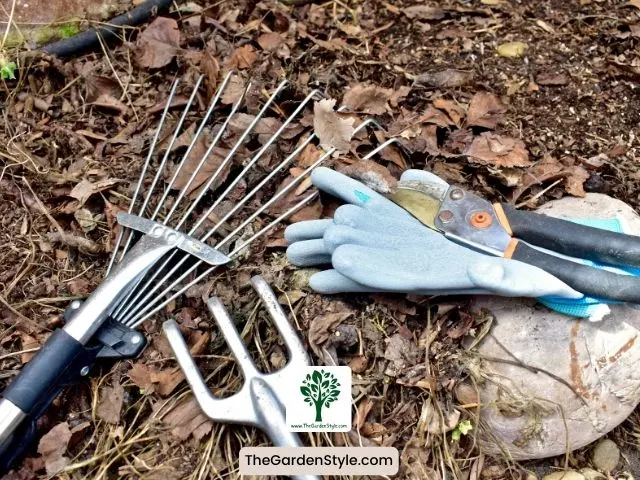
Ant-Repelling Plants
Certain plants naturally deter ants with their strong scents, making them useful additions to gardens prone to ant invasions. Strongly aromatic herbs like mint, tansy, thyme, and parsley release oils ants dislike. Insecticidal plants such as garlic, chives, alliums, and petunias also repel ants. Learn about growing aromatic herbs.
Interplant these around the garden’s edge, the most likely ant access points. You can also place repellant plants in containers between beds. Choose upright varieties, allowing you to reach the soil still for weeding and care. Let some go to flower as well to attract beneficial insects, further balancing your garden ecosystem.
Use repellant plants around fruit trees, berries, and vegetable plants that are especially vulnerable to ant and aphid damage. Try circling susceptible plants with a “guard” of those pest-deterring plants. Just be sure none inhibit the growth of your edibles through competition or allelopathic properties. With some thoughtful placement, ant-repelling plants provide organic protection for your most precious garden plantings.
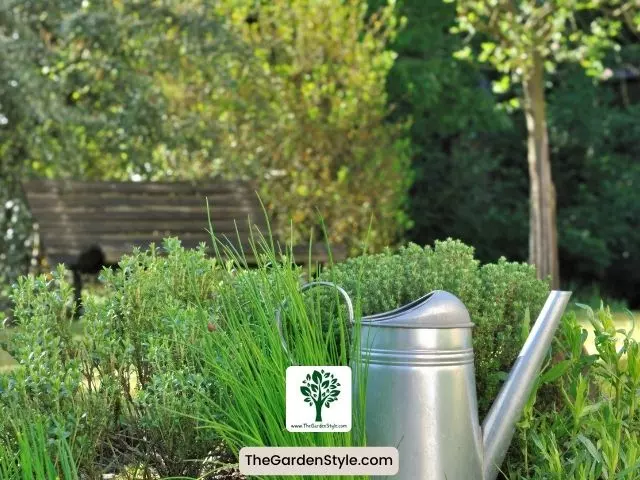
DIY Ant Repellents
Many common household products make effective short-term ant deterrents around the garden. You can sprinkle spices like cinnamon, crushed red pepper, black pepper, and dried ginger along areas ants traverse. These irritate ants on contact. Create longer barriers by outlining beds with chalk, ash, bone meal, or lime. Use care applying alongside plants, avoiding leaves and roots. Natural powdered diatomaceous earth sprinkled nearby also deters while safe for vegetation. Learn more about cinnamon for plants.
For direct application on plants, mix 1 part dish soap with 10 parts water. Add several tablespoons of vinegar or lemon juice to this light solution. Use a spray bottle to apply barriers on targeted plants, the ground barrier plants, and entry points like pavement cracks. Reapply after heavy rain or watering for ongoing issues. Always test diluted mixtures on small plant sections first before wide use. With some common, non-toxic ingredients, you can easily make your garden grounds irritating terrain for invading ants.
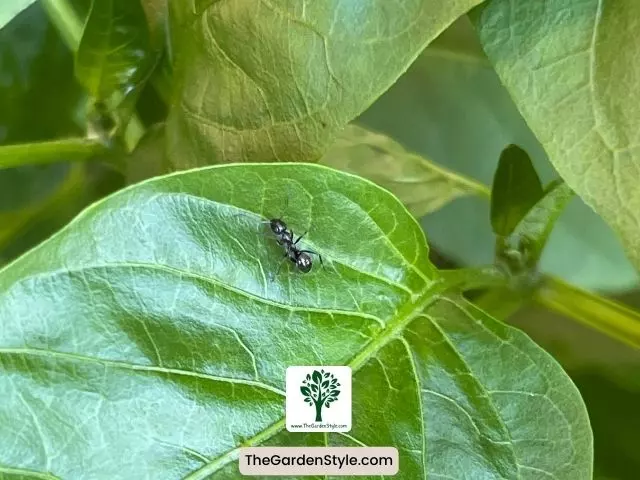
Numerous everyday household items serve as effective short-term ant repellents in garden spaces.
Eliminate the Colony
Using boiled water to eliminate ants is a method known as a “hot water treatment” or “boiling water treatment.” This approach involves pouring boiling water directly onto ant nests or colonies to kill the ants and disrupt their nests. The hot water penetrates the nest, killing the ants and their eggs and destroying their habitat.
Practice this method if you intend to eliminate ants and the ant nest is far enough from your plants. Boiling water can potentially harm the soil and surrounding vegetation. This method is considered a non-toxic and environmentally friendly way to control ants, particularly for outdoor areas.
Depending on the size and resilience of the ant colony, you may need to repeat the treatment if you notice ant activity persisting.
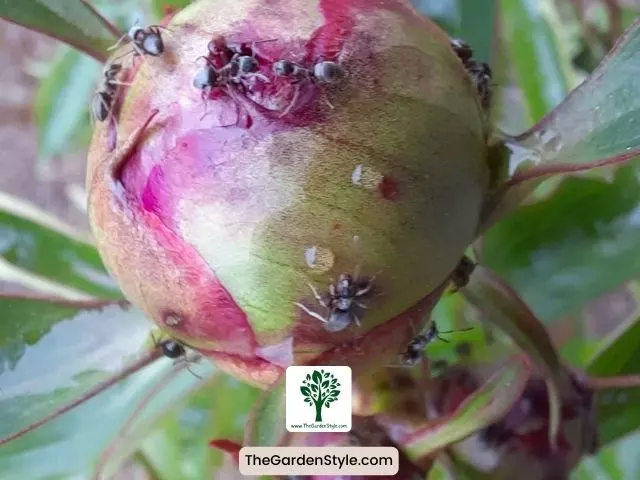
Barrier Methods for Ant Control
Creating Physical Barriers
Physical barriers blocking ant access to plants offer effective, non-toxic control. Use diatomaceous earth, a powder lethal to exoskeletons, as an abrasive deterrent. Simply sprinkle a line along garden borders, around tree trunks, or surrounding ant trails. The sharp powder cuts and dehydrates ants passing through. Reapply after rain or irrigation. Copper tape also blocks ants – they avoid crossing the conductive material. Wrap beds, apply around trunks, or outline containers with layers of copper tape to stop ants in their tracks. Both barriers require only periodic renewal for lasting prevention, physically excluding ants from garden plants.
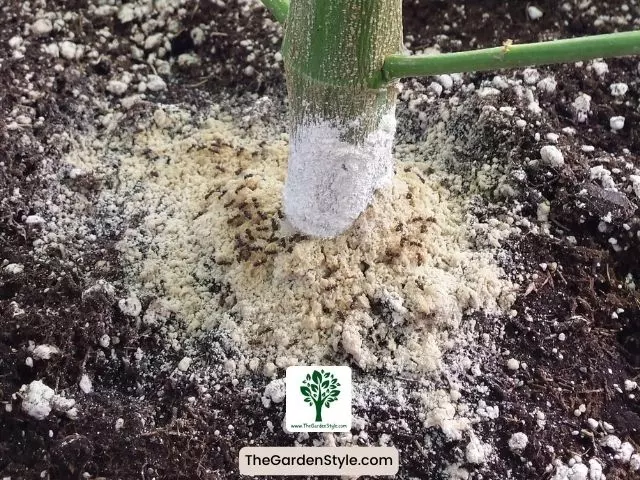
- Say Goodbye to Bugs – Kills a variety crawling insects including roaches, ants, fleas, silverfish, earwigs, bedbugs, and more
Natural Barriers
Household food wastes already in your kitchen make easy natural ant deterrents, such as used coffee grounds, citrus peels, crushed eggshells, and cinnamon sticks or powder. You can also outline planting beds or mix small amounts directly into potting soil for container plants. These strongly scented elements irritate and confuse foraging ant scout parties. They pose no risks of decomposing and may offer some soil nutrition, too. Replenish barriers after heavy rain. Use cinnamon sticks and citrus peels to make infused vinegar sprays, deterring ants from contact when sprayed along their trails or on plants. Avoid getting pest deterrents directly on plant leaves during application for best results.
Organic Pest Control Methods
Beneficial Insects
Beneficial insects offer natural ant control while pollinating plants. Ladybugs feast on aphid ant farms, while parasitic nematodes kill ants in the soil where colonies start. Attract these defenders with flowering plants offering nectar or alternate prey. Allow native vegetation around your landscape to shelter helpful insects, too. You can also purchase ladybug larvae, lacewing eggs, or nematodes and directly release them near ant trails or damaged plants. Provide water drops on flower petals and small mud puddles in the soil, and avoid pesticide use so populations are established. A second release may be needed. Soon, these organic agents will naturally control ants and other pests invading your garden. Learn more about how to use ladybugs in the garden.
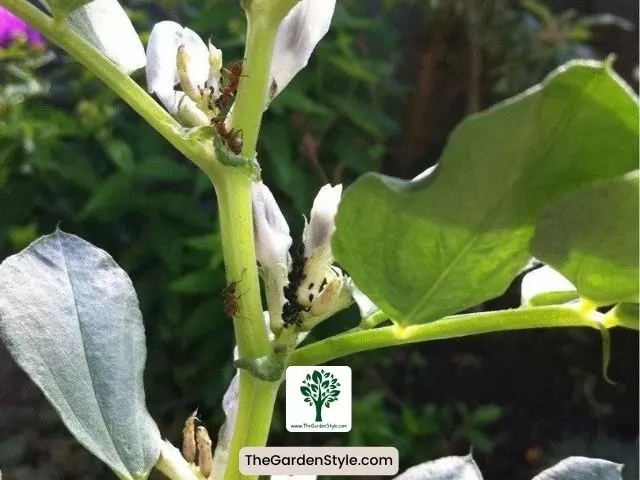
Neem Oil and Organic Insecticidal Soaps
Organic insecticidal soaps and neem oil also deter ants safely when infestations persist. Neem oil disrupts the molting and maturity of ants exposed to it. Mix a few teaspoons into a spray bottle filled with water and a small amount of mild eco-friendly soap. Test diluted mixtures on a few leaves first before wide application. Then spray at nest openings, along ant trails, and lightly on plant foliage where ants are actively feeding. The oil poses minimal risks to mammals, birds, and beneficial insects but should not be used where honeybees are present. Reapply weekly for heavy ant invasions after rain or watering. Organic chemistry can effectively break the ant lifecycle for lasting relief from these destructive garden pests. Learn more about what plants not to use neem oil on.
Maintenance Tips for Long-Term Ant Control
Regular Inspection
Consistently monitoring your garden landscape is key for early ant detection and rapid response, curbing damage. Inspect plants weekly for signs like wilting, honeydew, or leaves skeletonized by sap-sucking insects. Look under mulch near struggling plants and flip over containers to check for active ant nests beginning nearby. Follow ant scout parties to find entry points like cracks they exploit. Set out sticky traps periodically to gauge if populations spike. Being vigilant in spotting signs of ant infiltration right away means you can take quick, targeted action, preventing them from spreading and harming more vegetation.
Consistent Garden Care
Staying on top of standard garden care makes your landscape far less vulnerable to ant destruction. Maintain a routine schedule including weeding, pruning dead growth, monitoring soil moisture, turning compost into beds, and checking for pests weekly. Address issues with extra watering, amendments, or organic treatments promptly. In spring and fall, reapply natural perimeter barriers like diatomaceous earth. Keep beneficial plants like insectary flowers blooming and tidy entry points. With consistent care depriving ants of food and shelter, your garden thrives while repelling invaders. Print a checklist to display as a reference, ensuring you perform needed maintenance. Staying diligent with soil health, plant care, and sanitation provides the best guard against garden ant woes.
Contingency Plan
Even well-tended gardens can experience ant swarms requiring immediate response, limiting destruction. First, identify entry points and trim any vegetation touching structures. Coat these areas with tape barriers to block access. Spray vinegar or insecticidal soap mixtures directly on ants and trails to kill them. Remove heavily-infested plants to a separate area and rinse away honeydew. Boost plants with extra water and nutrition. Set out additional ant traps. Maintain remedies daily until activity ceases completely. Staying observant and taking prompt, decisive action keeps garden damage minimal if ants penetrate your defenses.
Here is a summary of the gardening tips for long-term ant control to prevent ants from coming back to your garden and garden beds.
| Maintenance Tips for Long-Term Ant Control | Description |
| Regular Inspection | – Consistently monitor the garden for early ant detection. – Inspect plants weekly for signs of ant activity and sap-sucking insect damage. – Check under mulch and containers for active ant nests. – Follow ant scout parties to identify entry points. – Use sticky traps for population monitoring. – Swiftly respond to signs of ant infiltration to prevent spreading and damage. |
| Consistent Garden Care | – Maintain routine care, including weeding, pruning, soil moisture monitoring, compost turning, and pest checks. – Address issues promptly with extra watering, amendments, or organic treatments. – Reapply natural barriers in spring and fall. – Keep beneficial plants blooming and maintain tidy entry points. – Consistent care denies ants food and shelter, promoting a thriving garden. Display a checklist for reference. |
| Contingency Plan | – Develop a contingency plan for immediate response to ant swarms. – Identify and block entry points with tape barriers. – Use vinegar or insecticidal soap mixtures to kill ants directly. – Remove heavily infested plants and rinse away honeydew. – Provide extra water and nutrition to affected plants. – Set out additional ant traps. – Maintain remedies daily until ant activity ceases. – Prompt and decisive action minimizes garden damage if ants breach defenses. |
Conclusion
Protecting your precious garden landscape and vegetable garden from ant invasions requires diligence but is very achievable. Regular inspection, barrier deterrents, plant health care, and prompt response if pests arrive, allow your flowers and edibles to thrive ant-free. Avoiding harsh chemicals through organic approaches produces the healthiest environment possible for the plants you nurture and enjoy. Implement these integrated tips consistently each season so you can relax fully amidst your garden and not fend off tiny invaders. Let your landscape be a peaceful, flourishing oasis safeguarded from destruction by annoying ants.
If this post about how to keep ants out of your garden was helpful, please share it:
